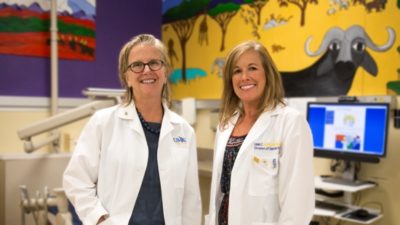Schools of Dentistry and Nursing and Health Studies awarded up to $4.38 million NIH grant
The University of Missouri-Kansas City School of Dentistry and School of Nursing and Health Studies each are longtime leaders in providing health care to children, especially in low-income and minority populations. Now, supporting this ongoing work, the National Institutes of Health awarded the schools research funding potentially totaling about $4.38 million in the next five years.
UMKC investigators plan to collaborate with the Kansas Bureau of Oral Health School Sealant Program and examine the impact of dental hygienists in Kansas, assessing oral health and social outcomes in pre-kindergarten- through high school-aged children from 17 underserved, primarily rural communities who receive school-based care from dental hygienists. A cost analysis also will be conducted. This project leverages existing relationships established by the Kansas Bureau of Oral Health and will reach children in about 355 schools in 108 school districts throughout the state.
“The Kansas Department of Health and Environment’s Bureau of Oral Health is proud to have this opportunity to partner with the University of Missouri-Kansas City Schools of Dentistry and Nursing and Health Studies and all stakeholders involved to further the goals of this National Institutes of Health grant,” said KDHE Bureau of Oral Health Director Cathleen Taylor-Osborne. “We look forward to collaborating with our partners to decrease oral health disparities of children in our state. Kansas is uniquely positioned in providing oral health care by the extended-care permit dental hygienist and this funding opportunity will allow the evaluation, data collection and formulation of evidence-based recommendations to further improve the health of Kansas children.”
The UMKC School of Dentistry is the only public dental school in the Missouri and Kansas region. It has an agreement with the state of Kansas to educate dentists from Kansas in addition to its priority for educating dentists in Missouri. The agreement advances oral health in the region.
In 2003, Kansas established an alternative oral care workforce model by altering dental hygiene scope of practice and supervision regulations through extended-care permits. An extended-care permit allows dental hygienists, who meet specific criteria and are sponsored by a Kansas dentist, to deliver care directly to children in their community without being directly supervised. Missouri doesn’t currently permit that care model.
“This project will identify cost-effective, evidence-based strategies that improve access to dental providers in rural and urban underserved communities and ultimately reduce the number of children in Kansas who experience pain and suffering from oral health problems that are largely preventable,” said Melanie Simmer-Beck, UMKC School of Dentistry professor and co-primary investigator of the grant.
“I am excited to be working on this important public health project,” said Pat Kelly, UMKC School of Nursing and Health Studies professor and co-primary investigator of the grant. “The development of the role of the extended-care dental hygienist parallels that of advanced practice nurses, and it is important that we rigorously assess the outcomes for patients and communities. As a public health nurse, I have seen only too frequently the negative health effects that low-income children suffer as a result of being unable to access traditional oral health services. This funding provides us with an opportunity to document the impact of the excellent care provided by hygienists.”
The grant is an example of interprofessional collaboration, an area in which UMKC’s health science schools have a strong focus because of the excellent patient outcomes that result.
“We are thrilled that Drs. Simmer-Beck and Kelly are collaborating across their disciplines of dentistry and nursing to bring greater understanding of the impact of oral health workforce policy,” said Marsha Pyle, dean of the UMKC School of Dentistry. “Their work will better quantify our understanding of the outcomes of oral health measures and related social outcomes that have been impacted by policy level changes linked to workforce models.”
“This grant award reflects our commitment to capitalizing on the synergistic talents of our interprofessional colleagues when they collaborate to achieve better health outcomes,” said Ann Cary, dean of the UMKC School of Nursing and Health Studies.
The award is part of 10 research cooperative agreements awarded nationwide by the NIH aimed at eliminating inequities in access to care and improving the oral health of children. The awards of up to five years each support the Multidisciplinary and Collaborative Research Consortium to Reduce Oral Health Disparities in Children, a new initiative of the NIH’s National Institute of Dental and Craniofacial Research, with funding phased in as milestones are achieved.

